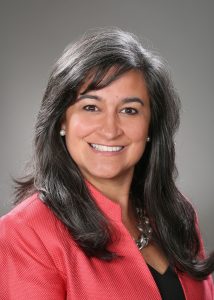By Amanda F. Whittle, J.D., CWLS, Chair of the State Child Fatality Advisory Committee
It hasn’t been business as usual for the State Child Fatality Advisory Committee (SCFAC) for the past 12 months. When I accepted the role as Chair of the committee in the Fall of 2022, committee members shared with me that they wanted the committee’s work to truly make a difference for South Carolina’s children.

Amanda F. Whittle, J.D., CWLS, is chair of the State Child Fatality Advisory Committee. She also serves as executive director of the South Carolina Department of Children’s Advocacy and the state’s first state child advocate.
In an effort to be more focused and intentional in its mission to decrease incidences of preventable child deaths, the committee decided in late 2022 to explore a different approach to its review processes. The overwhelming response of the committee was shared by Santana Jones, former systems transformation program manager at the Department of Social Services, “I am excited about this upcoming year, that we will leave the meetings knowing we are making South Carolina better for children.”
Safety Science
The National Partnership for Child Safety has used safety science to build a body of knowledge about what works in preventing child maltreatment and fatalities. Members of the SCFAC met as a workgroup, applied the approach, and found the results to be helpful. The committee voted to incorporate safety science mapping for its state-level child death reviews beginning in 2023. This included a significant change to the agendas.
The committee’s agenda historically was established based on the assigned SLED agent and included multiple causes and manners of death from different years. Committee members voted to modify this approach for 2023 to create agendas based on manner of death (homicide, suicide, accidental, natural or undetermined). These changes allowed the committee to identify trends in causation and system involvement and to pull representative samples and themes to map.
Cross-Agency Training, Collaboration and Technical Assistance
During 2023, the committee engaged in training, collaboration, and technical assistance. SLED Captain Trista Baird presented Child Death Investigations Task Force Training 101 regarding the task force’s investigatory processes and the roles of coroners, law enforcement, and other entities in child death investigations. Assistant U.S. Attorney Stacey Haynes shared the USOA’s leadership role with the Project Safe Neighborhoods program which is designed to reduce gun and gang-related violence. Ellen Weaver, State Superintendent of Education, shared important information about the role of schools in child fatality prevention and the committee’s access to education data.
During 2023, in addition to its regular schedule, the committee had two business meetings. Dr. Mike Cull of the University of Kentucky provided committee members with different approaches to fatality reviews and how other systems have improved outcomes. Christina Rosato of the University of Kentucky led the committee through a Lean Six Sigma exercise to map the SCFAC’s current processes and future goals. The current-state and future-state mapping identified actionable steps to improve the committee’s effectiveness.
Local Child Fatality Reviews
Issue: One example of the future-state map focused on the committee’s desire to obtain additional aggregate epidemiological data to support its review and recommendations. Local Child Death Reviews (LCDRs), by necessity, focus on determination of cause and manner of death and DSS/CPS and law enforcement’s initial responses or contacts. This may include a death re-enactment, interviews concerning perpetrators, and assessment of safety and risk of other children in the home. Many data points are not collected at this point, and the involvement of other agencies is not consistently discussed until a fatality review is held at the state level.
Mapping: Through the mapping process, the committee determined it would be helpful to have a secondary or supplemental LCDR process input information which would be available to the SCFAC. The committee acknowledged that additional resources would be necessary to lead the work. Our committee discussed piloting a process to create capacity for a more robust or supplemental LCDR process.
Data Entry Collaboration
Issue: For many years, committee members have discussed county level data-entry into the National Centers Case Reporting System to consistently provide the committee with additional data points from all counties in the state, but there are logistical challenges. Coroners have been funded to ensure the county reviews occur, but some coroners do not have sufficient staff and resources to enter data for every child fatality in addition to the statutorily required death reviews and investigations.
Mapping: Through the mapping process, the committee recommended the need for additional capacity, and DHEC was suggested as a possible partner to explore who and how to support the data upload. Thereafter, DHEC Director Dr. Ed Simmer and his team welcomed additional thought and conversation regarding what they described as an amazing public health opportunity.
Fatality Prevention
In the cases of accidental deaths (2021-2023) reviewed by the SCFAC, the number of unsafe sleep deaths of infants and young children was alarming. During 2023, the committee recommended support for evidence-based, voluntary home visiting programs through Children’s Trust of South Carolina, the state’s recipient of the federal home visiting grant. These programs work one-on-one with new parents to help them learn how to give their babies a strong start in life, including how to keep their babies healthy and safe while they sleep. The committee plans to continue to be focused and intentional in identifying other recommendations that align with child fatalities in South Carolina.
Looking Forward
The State Child Fatality Advisory Committee was created by statute in 1993 and is composed of twenty (20) members including law enforcement, legal, medical, child-serving state agencies, legislators, and two members from the general public. With focused agendas, cross-agency training and collaboration, and safety science mapping, the committee is better equipped to communicate and strategize fatality prevention recommendations and initiatives. We are looking forward to building on these efforts in 2024.
Amanda Whittle serves as executive director of the South Carolina Department of Children’s Advocacy and South Carolina’s first state child advocate.



